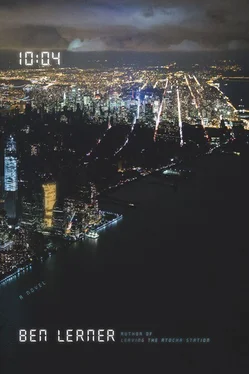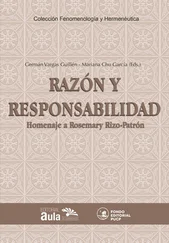He tells the boys to listen for the waves and then to imagine that this bunk bed is a ship at sea in search of the world’s largest and most vicious shark. What does vicious mean, Cyrus stops sucking long enough to ask. It means mean and ready to eat people up. The moon is high in the sky and you can see its light on the water. We have to be very, very quiet because we don’t want the shark to hear us. We’re sailing out to sea to capture this shark and so we have to look very carefully in the moonlight for its fin. Its dorsal fin, Cyrus contributes from his bunk. That’s right, its dorsal fin, the author whispers, Theo’s hand searching in his shirt.
I see it, the author quietly exclaims, but then he encounters a problem with his tense. He doesn’t know how to continue the story in the present, at least not in a way that would put the boys to sleep as opposed to enlisting their participation in a kind of game. To his surprise, he feels the onset of panic, cold spreading through him. The particularly precocious author can’t handle the formal complexity of the bedtime story. He takes a long pull on the beer, which doesn’t help. The author is having difficulty ordering his speech.
He takes four deep, deliberate breaths, counting them out as Roberts suggests. Theo imitates him, inflating his little chest. This happens to him several times a day, this sudden fear that symptoms are presenting. Now that we’ve spotted the shark, the author resumes, let’s put down the anchor of our boat and I’ll tell you all about him. He’s reassured by the sound of his own voice — no audible tremor. There once was a shark named Sam, who was thought vicious but ultimately proved to be brave and kind when he saved a family whose ship was sinking, et cetera. And he led the family to a sunken treasure, although Theo was asleep by then.
The author opened the door to his room. Hannah was towel-drying her hair in front of a long mirror, the reflection of her face blocked by her body, though she could see him. “I’ll be right down,” she said.
Downstairs he found the last Corona and joined the others. He was surprised to feel drunk already.
“We’re thinking of going to the beach,” his brother said.
“The old folks are going to bed,” his dad said. His mom was already in their room. He had no idea what time it was.
“Come with us,” his sister-in-law said.
He yelled up to Hannah to join them when she could. His brother found a bottle of red wine in a kitchen cabinet. They opened it and walked out back and across the moonlit gravel to a path that led around another bungalow and down to the beach. The path was covered in crushed shells and surrounded by low trees, mangroves probably. Small things fled their steps in the dark, lizards or insects. Then they emerged onto the beach and he was stunned by the panoramic sky, the impossible number of stars. The sand was brighter than he expected, glowing, and they walked midway to the water and sat down on it, passing the bottle between them.
There were a few small fires along the beach where people were camping. They tried to remember the last time they’d been on a beach together. Had it been ten years ago in Barcelona? No, there had been a wedding in L.A.
Then his brother asked, “Where’s Ari? Did she go to bed already or is she coming?” They heard what could have been the slamming of a screen door in the distance, and his brother said, “That must be her.”
But the author said, “She isn’t in this story.” He thought his speech sounded a little slurred, his voice issuing from far away. He heard laughter, and turned and saw the embers of cigarettes on the balcony of one of the beachfront condos.
“Why not?” his sister-in-law asked with disappointment.
He picked up the bottle his brother had screwed into the sand and drank. It took him a long time to say he didn’t know how to explain it, that if he knew how to explain it she would be walking toward them now, not Hannah. I’ve divided myself into two people. A cut across worlds. Footfall on gravel, then crushed shells, silence when she reached the sand.
There was the sound of clapping from the condo, and he turned back to see that someone had launched a balloon from the balcony. No, a lantern, an illuminated red paper globe, probably a threat to sea life. It floated slowly past them and out over the water. From their respective present tenses, they all watched the same turbulent point.
* * *
The day of the extractions, he had taken the train with Liza to the office on Madison Avenue near Central Park. They rode the elevator to the twenty-eighth floor. He signed in with the receptionist, and he and Liza hung up their coats and sat down in the cramped waiting room. He was embarrassed to admit how nervous he was, but Liza knew it, and reassured him by making gentle fun of him, asking if he had any manuscripts she should burn if he didn’t “pull through.”
It wasn’t long before a nurse called his name and he passed through the door beside the receptionist and was led to a windowless room. He tried to make himself comfortable in the chair as the nurse took his blood pressure and remarked on the weather and then placed some kind of monitor on his ankle. Soon a muscular male nurse in purple scrubs entered with an IV stand, untangled and attached various wires, and cleaned his arm with alcohol. The dentist appeared, smiled at the IV, and said in his Romanian accent, “Do I really scare you that much.” The male nurse finished setting up the IV, left, and returned with a stand of tools that he wheeled in front of the dentist. The author looked away while the first nurse sank a needle into his vein.
He was in the middle of asking the dentist how long the procedure would take when he realized he was hearing his voice from far away; he left the question unfinished. That was because he was also walking with Liza in the park explaining how he had been right to elect the twilight sedation, late light filtering through the lindens. He knew he was still in the chair and at one point heard the dentist ask, pausing the drill, if he was okay, heard himself grunt affirmatively, but he was also explaining to his mom on the phone that the procedure had turned out to be a nonevent. He was suffused with warmth; the universe was benevolent, the lamp positioned to shine into his mouth was the nourishing sun. He knew it wasn’t but it also was, and then the dentist was saying, “All done.” He had no idea if five minutes or an hour had passed. He realized the first nurse was giving him instructions and he became aware of gauze in his mouth when he said, “Yes, yes.” Then he followed her to the waiting room without feeling the floor beneath him and watched but did not listen as she repeated the instructions to Liza, who thanked her and helped him into his coat.
The dazzling sun cleared his head a little, and by the time they were in a cab his sense of time had stabilized, but he was still so thoroughly suspended in the warm glow of the drugs that he experienced the sudden starting and stopping of the taxi while they inched their way east as a gentle rocking motion. He felt no pain, and only the awareness that his tongue was numb was vaguely uncomfortable, reminding him of the wounds packed with gauze. Had Liza been talking this whole time? He turned and faced her as they merged onto the FDR Drive, and she looked beautiful, her arms raised to pull her light brown hair into a ponytail; he watched her chest rise and fall as she breathed, saw the thin gold necklace she always wore against her perfect collarbone. Then without transition he was looking at the skyline of lower Manhattan, the buildings growing larger and more detailed as the taxi approached, though he was not aware of moving. Then he was aware of moving at an impossibly smooth rate, and there was the Brooklyn Bridge, cablework sparkling. Liza was cursing at the little touch-screen television in the taxi, which she couldn’t seem to turn off, and he reached out a hand to help her and experienced contact with the glass as a marvel, like encountering solidified, sensate air. Then he was smoothing her hair back and she was laughing at this uncharacteristic intimacy, something he’d done only a few times in their six years. Now the view again, and it occurred to him with the force of revelation:
Читать дальше










